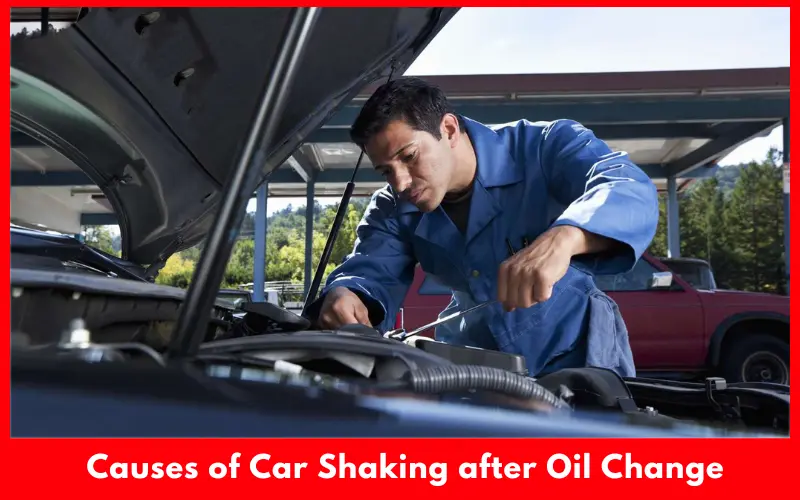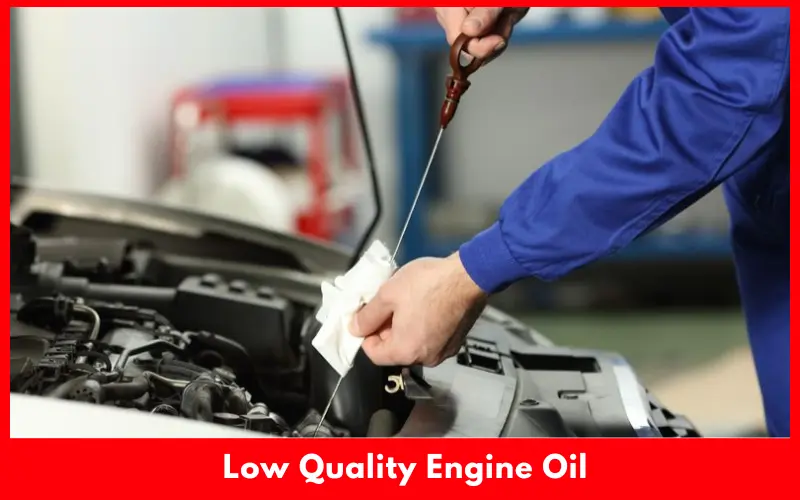Car engine oil changing may seems a three steps straightforward process. But a little mistake can cause severe damage to the engine and experiencing shaking can be the announcement. You are worried and finding reasons and solutions of car shaking after oil change.
I discussed the most potential reasons for car shaking after oil change along with simple solutions. We’ll also discuss the further result of car shaking, and the sign of proper oil changes.
Article Summary
Solutions of Car Shaking after Oil Change
Cars usually vibrate or shake due to wheel and tire problems, worn suspension parts, and joins. Damaged brake rotors or faulty engine and transmission may also cause a car to shake during driving.

But if you notice your car is shaking after oil changes, none of those reasons are responsible. Instead, a car may shake due to overfill or under filled oil and damage the oil sensor.
1. High Oil Level
If you have recently changed the engine oil and experienced car shaking, the over-fill condition can be responsible. Hence, the crank may slap around in the higher oil level and cause vibration from engine imbalance. If the level is too high, the oil may be aerating which isn’t good.
Depending on the number of cylinders your vehicle has, it can take around 4 to 5 quarts of oil and you should refill between the minimum and maximum mark. So your vehicle’s max capacity can be 5 quarts.
If you use 5.5 quarts, you will overfill it. To solve this problem, you must empty the full can instead of draining it out a little bit. Then refill 5 quarts. Overfilling can also cause harsh wear and tear on the car’s various parts like cylinders and pistons.
2. Low Oil Level
Apart from overfill; the low oil level can also cause your car to shake after an oil change. If the oil level is below the minimum mark, the oil level is low. Hence, the oil may stop lubricating the car’s engine parts and cause metal friction and end up producing shaking.
To fix the problem, top up your engine oil, but don’t exceed the dipstick’s maximum mark.
3. Oil Leakage
Oil leakage can cause the engine’s internal components to starve for oil and increase significant friction. If a large amount of oil spills, the vehicle will experience frequent vibration because of internal tension and low oil pressure.
Therefore you can experience car shaking and check the engine light on after an oil change. Check engine light can also come out after changing the oil if you don’t fully seal the dipstick or fit the oil filler cap backways.
The common signs of oil leaks are noticing puddles of oil under the car’s parking area. In this case, look for loose drain plugs and broken seals.
To solve the oil leakage problem and car shaking, tighten the seal firmly or replace the broken part. Gaskets and plugs can break down and the seals can wear out over time.
4. Low-Quality Engine Oil
If you use low-quality oil or a mixture of low and high-quality, it can reduce the lubrication of the piston’s rings. If the piston becomes dry, the engine won’t be able to move smoothly.

As a result, you can experience jerks and quick vibration. Low-viscosity oil is one of the key reasons for a car’s vibrations. So use the right type of oil and avoid using thick oil so your car can run optimally and smoothly.
5. Oil Pressure Sensor
Some people remove the oil pressure sensor during changing the oil. They do so to clean the sensor and remove contaminants from dirty oil. But unfortunately they re attach the sensor wrongly.
As a result, the sensor won’t show the right oil level and you won’t be aware even if the oil level gets low. So the thing that can happen is that you’ve topped up an insufficient amount of oil during an oil change. The low engine oil is increasing the component’s friction and causes vibration.
To solve this problem, refill the engine with the right amount of oil and then install the sensor properly. However, you don’t require disconnecting the oil pressure sensor to clean it during changing the oil.
You can remove any buildup on the sensor keeping it in the engine. Simply flush the engine with a solution that is designed for this job.
6. Clogged Oil Filter
If the engine’s oil filter gets clogged, it can cause your car to shake. The filter usually prevents dirt from entering the engine with oil. So it can get jammed over time and require regular replacement.

Otherwise, a clogged filter can reduce lubrication flow and let harmful particles and sludge build up in the engine. As a result, your may car starts shaking.
In addition, clogged filters disturb the motor oil flow throughout the car’s system and increase the friction between various metal parts. This excessive friction can result in shaking the car during driving.
Can you Drive Car if the Engine is Shaking?
Shaking a car after an oil change isn’t normal at all particularly if this happens due to vibrate of the engine. However, if your car is shaking due to the vibration of the steering wheel, oil changing isn’t responsible for it. May be steering assist is reduced.

Instead, it can happen due to a bad tire, bad suspension components, or warped brake rotors. Let’s back to the topic. If your car’s engine shakes due to an oil change and you don’t address it promptly, it can bring these adverse consequences:
Engine Wear and Tear
If your car shakes due to improper lubrication, it can cause increased friction among the engine parts. Over time, it can lead to increased wear and tear and reduce the engine’s longevity.
Reduced Performance
If your car keeps shaking after oil and you don’t fix the problem, it can reduce your car’s performance ultimately. It means you can experience rougher riders, reduced power, and lower fuel efficiency.
Engine Damage
In the worse case, car shaking can cause significant engine damage. For example, if the engine has an insufficient amount of oil or the oil becomes contaminated, the engine parts can become damaged and cost expensive repairs.
Accidents
If you keep driving with your shaking car, you can lose control suddenly while driving. As a result, you can experience severe accidents.
As you can see, shaking the car isn’t normal in any case. Hence it’s crucial to address and solve the underlying problem to avoid these potential consequences. So, if your car starts to shake after an oil change, take it to a mechanic as soon as possible to diagnose and fix the issue.
However, you can determine the answer to the following questions to better help your mechanic solve the problem quickly and successfully:
- Does the shaking get worse when you increase speed?
- Is the shaking only happen at a certain speed? If yes, at what speed?
- Does the shaking come under the seat?
- Do you hear any other abnormal sounds during driving?
- Does the car shake when the car is standing and the engine is still running?
- Is the shaking coming from the steering wheel?
How should your Car Feel after an Oil Change?
After changing the oil, your vehicle should get better gas mileage as it should get better engine lubrication. The engine oil should also enhance compression and reduce metal friction. Hence you should be able to accelerate more efficiently.
In addition, proper engine change should remove dirt and debris from the engine that can cause the engine to run less efficiently. Overall, proper oil change in the car means its internal system should run smoothly, and prevent blockage that can cause later issues.
FAQs
Can a needed oil change cause shaking?
If your car needs an oil change, it can start shaking even while idling. Old oil thickens and can’t lubricate the engine components. Hence excessive metal friction can cause your car to shake.
Why does your car engine idle rough after an oil change?
If your car engine runs rough after an oil change, particularly at idle, the engine has been overfilled with oil. It can also happen if you top up the engine with wring type of oil.
Can your car shake if the oil change is overdue?
The Overdue oil change symptoms are low oil level, dark oil, weak fuel economy, and service warning lights. Fortunately, all of these reasons are responsible for shaking the car. Even you can experience all of these problems after driving the car for only a few months with an overdue oil change.
Final Words
As you can see, the car can shake after oil change due to plenty of reasons and an inaccurate top-up is the main culprit. A proper oil change at the right time can help avoid this concerning experience.
So, choose the right type of oil for your car engine, and refill the right amount. If you already experience car shaking, don’t decide to keep driving. Instead, take the car to an auto repair shop to avoid costly repair and severe injury.

